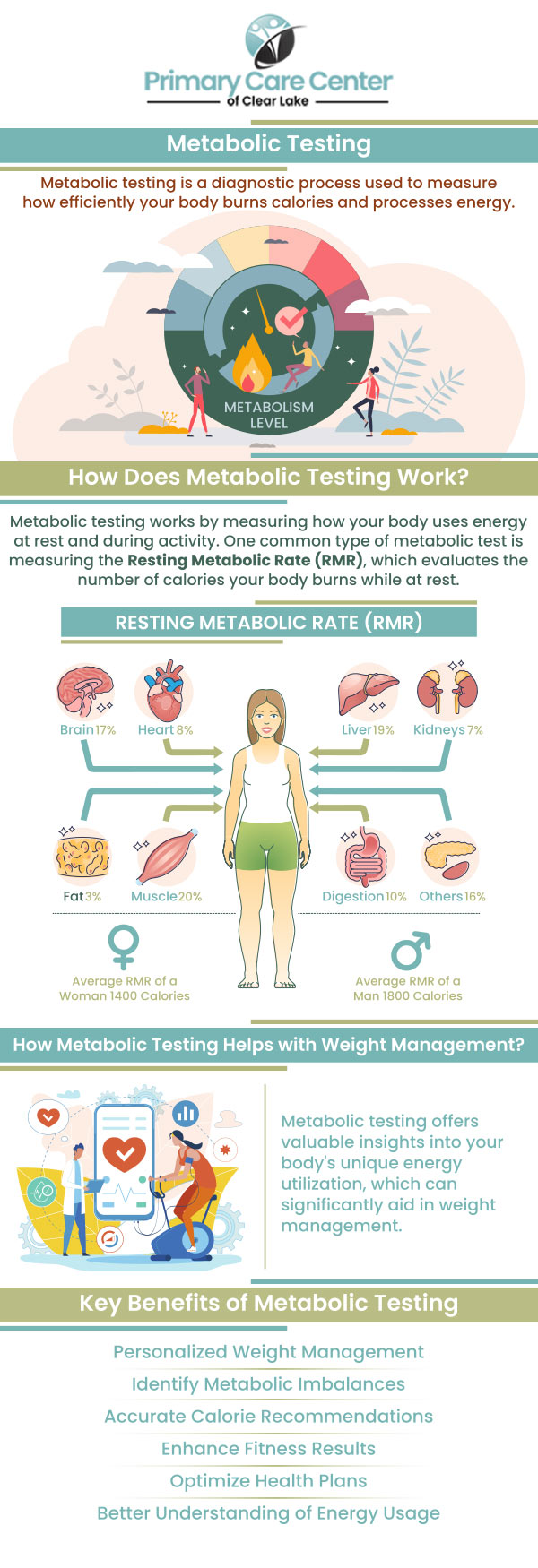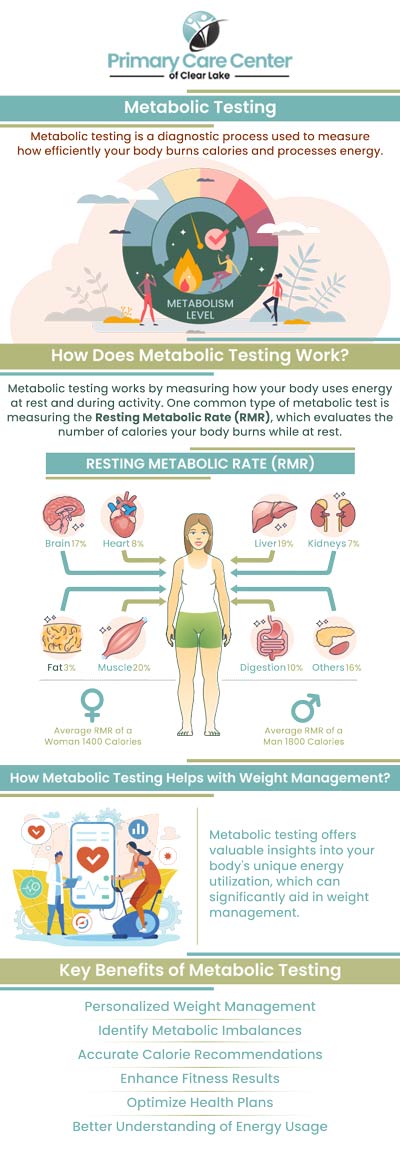Metabolic Profile Testing Services Webster TX
A metabolic panel measures the concentrations of certain chemicals in your blood. You may learn vital information about your health and well-being from these measurements. Visit Dr. Smriti Choudhary, M.D., and Dr. Niraj Choudhary, M.D. for convenient tests. For more information, please contact us or schedule an appointment online. We have convenient locations to serve you in Webster and Pasadena, TX.




Table of Contents:
What is a metabolic profile blood test?
What are metabolic tests used for?
What does a basic metabolic profile show?
What tests are in a metabolic profile?
What is the difference between a CMP and a BMP?
A metabolic profile is a blood test that provides information about the body’s electrolyte balance and the performance of the liver and kidneys. There are two types of metabolic profile blood tests: the comprehensive metabolic panel (CMP) and the basic metabolic panel (BMP). These blood tests are often used as diagnostic tools by healthcare professionals to assess various aspects of a patient’s health. Often, these tests are used as part of routine screenings, such as during an annual physical exam. By measuring levels of enzymes, proteins, waste products, and electrolytes in the blood, these tests can be used to detect or monitor a range of medical conditions, including liver and kidney disease, diabetes, electrolyte imbalances, and metabolic disorders.
Metabolic blood tests are used for a variety of reasons, with the most common being assessing the body’s metabolic functions. For example, these tests are essential for diagnosing and monitoring conditions such as diabetes mellitus and metabolic syndrome. Furthermore, metabolic tests play a crucial role in assessing liver and kidney function by measuring levels of enzymes, proteins, waste products, and electrolytes in the blood. Overall, metabolic tests offer valuable insights into metabolic function and are essential for diagnosing medical conditions, monitoring health status, and guiding treatment decisions.
A basic metabolic panel (BMP) provides insights about the levels of:
• Glucose – One of the primary components of a BMP is the measurement of blood glucose levels. Abnormal glucose levels are a sign of underlying conditions such as diabetes or hypoglycemia.
• Electrolytes – This blood test provides measurements of essential electrolytes such as sodium, potassium, chloride, and carbon dioxide. Electrolytes play crucial roles in maintaining fluid balance, regulating blood pressure, and supporting nerve and muscle function.
• Waste products – The panel measures levels of waste products such as blood urea nitrogen (BUN) and creatinine in the blood. BUN is a byproduct of protein metabolism, while creatinine is a waste product generated by muscle metabolism. High levels of these waste products indicate problems with the function of the kidneys.
The tests included a metabolic profile, which will depend on the specific type of panel administered. If you receive a basic metabolic panel, or BMP, a blood sugar test, an electrolyte balance test, and a kidney function test will be included. On the other hand, a comprehensive metabolic panel, or CMP, involves the tests in the BMP along with protein level tests and liver function tests.
By analyzing various aspects of your metabolic health, both of these panels provide in-depth insights into your metabolic health. If your panel shows abnormal levels of blood sugar, electrolytes, or waste products produced by the kidneys or the liver, your healthcare professionals will inform you of the additional screenings that are recommended to determine the root cause of the imbalance.
The primary distinction between a CMP and a BMP is that a BMP is more limited. The CMP is considered much more extensive as it screens for various markers of liver health that are not included in a BMP. This is not to say that BMPs aren’t important. BMPs are used as part of routine screenings to evaluate overall metabolic health, as well as for the diagnosis and monitoring of conditions like kidney disease.
A CMP measures 14 different substances in a sample of your blood, including albumin, glucose, bilirubin, and various enzymes produced by the liver. This broader scope allows healthcare providers to obtain a more comprehensive overview of a patient’s health status. Most commonly, a CMP is used in situations where a more detailed assessment of metabolic function is needed, such as diagnosing liver disorders.
Overall, while both a BMP and a CMP provide valuable insights into your health, CMPs offer a more thorough assessment by including additional tests related to liver function and protein levels. To determine which panel is right for you, consult one of our dedicated healthcare providers. For more information, please contact us or schedule an appointment online. We are conveniently located at 13920 Osprey Ct, Suite C, Webster, TX 77598. We serve patients from Webster TX, Bacliff TX, Dickinson TX, Seabrook TX, League City TX, Clear Lake City TX, and surrounding areas.
Check Out Our 5 Star Reviews


Additional Services We Offer
• 2D ECHO
• ABI Testing
• Obesity Medicine
• Alzheimer’s Disease
• Anxiety Disorder
• Aortic Aneurysm Screening
• Arthritis
• Asthma
• Body Composition Testing
• Cancer Screening
• Carotid Doppler
• Chronic Condition Management
• Chronic Kidney Disease
• Chronic Obstructive Pulmonary Disease
• Congestive Heart Failure
• COPD & Asthma
• Coronary Heart Disease
• COVID-19 Testing
• Dementia Screening
• Depression
• Diabetes Management
• EKG
• Food Allergies
• Food Sensitivity
• Geriatric Care
• Hypertension
• Outdoor Allergies
• Parkinson’s Disease
• Primary Care
• Resting Metabolic Rate Testing
• Thyroid Scan
• Wellness Exams for Men
• Wellness Exams for Women
• Ozempic
• Integrative Medical Weight Loss
• Men’s Health
• Testosterone Replacement Therapy
• Erectile Dysfunction
• Testosterone Gel and Injections
• Women’s Health
• Menopause
• PCOS
• Hormone Replacement Therapy
• Individual Nutritional and Lifestyle Counselling
• Indoor Allergies
• Internal Medicine
• Lipid Disorders
• Medical Weight-Loss
• Osteoporosis

Additional Services We Offer
• 2D ECHO
• ABI Testing
• Obesity Medicine
• Alzheimer’s Disease
• Anxiety Disorder
• Aortic Aneurysm Screening
• Arthritis
• Asthma
• Body Composition Testing
• Cancer Screening
• Carotid Doppler
• Chronic Condition Management
• Chronic Kidney Disease
• Chronic Obstructive Pulmonary Disease
• Congestive Heart Failure
• COPD & Asthma
• Coronary Heart Disease
• COVID-19 Testing
• Dementia Screening
• Depression
• Diabetes Management
• EKG
• Food Allergies
• Food Sensitivity
• Geriatric Care
• Hypertension
• Outdoor Allergies
• Parkinson’s Disease
• Primary Care
• Resting Metabolic Rate Testing
• Thyroid Scan
• Wellness Exams for Men
• Wellness Exams for Women
• Ozempic
• Integrative Medical Weight Loss
• Men’s Health
• Testosterone Replacement Therapy
• Erectile Dysfunction
• Testosterone Gel and Injections
• Women’s Health
• Menopause
• PCOS
• Hormone Replacement Therapy
• Individual Nutritional and Lifestyle Counselling
• Indoor Allergies
• Internal Medicine
• Lipid Disorders
• Medical Weight-Loss
• Osteoporosis





